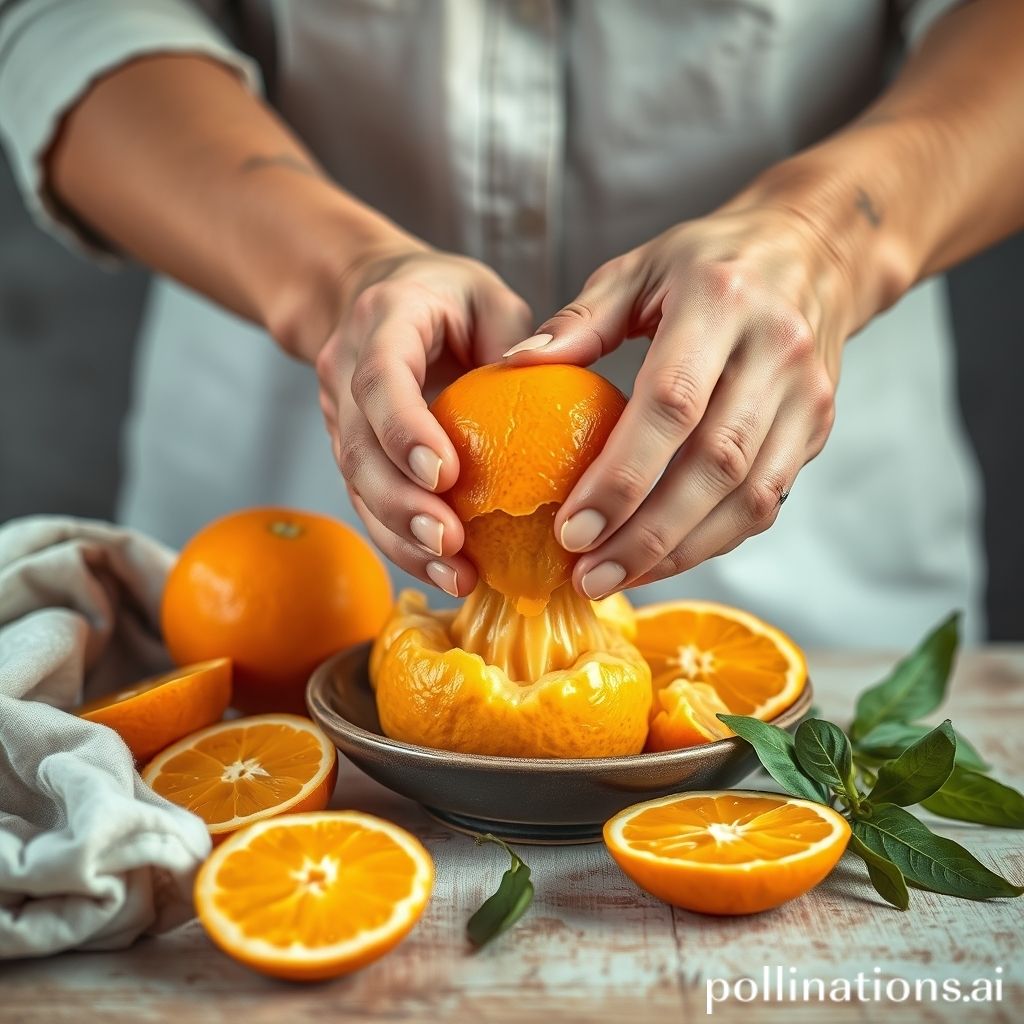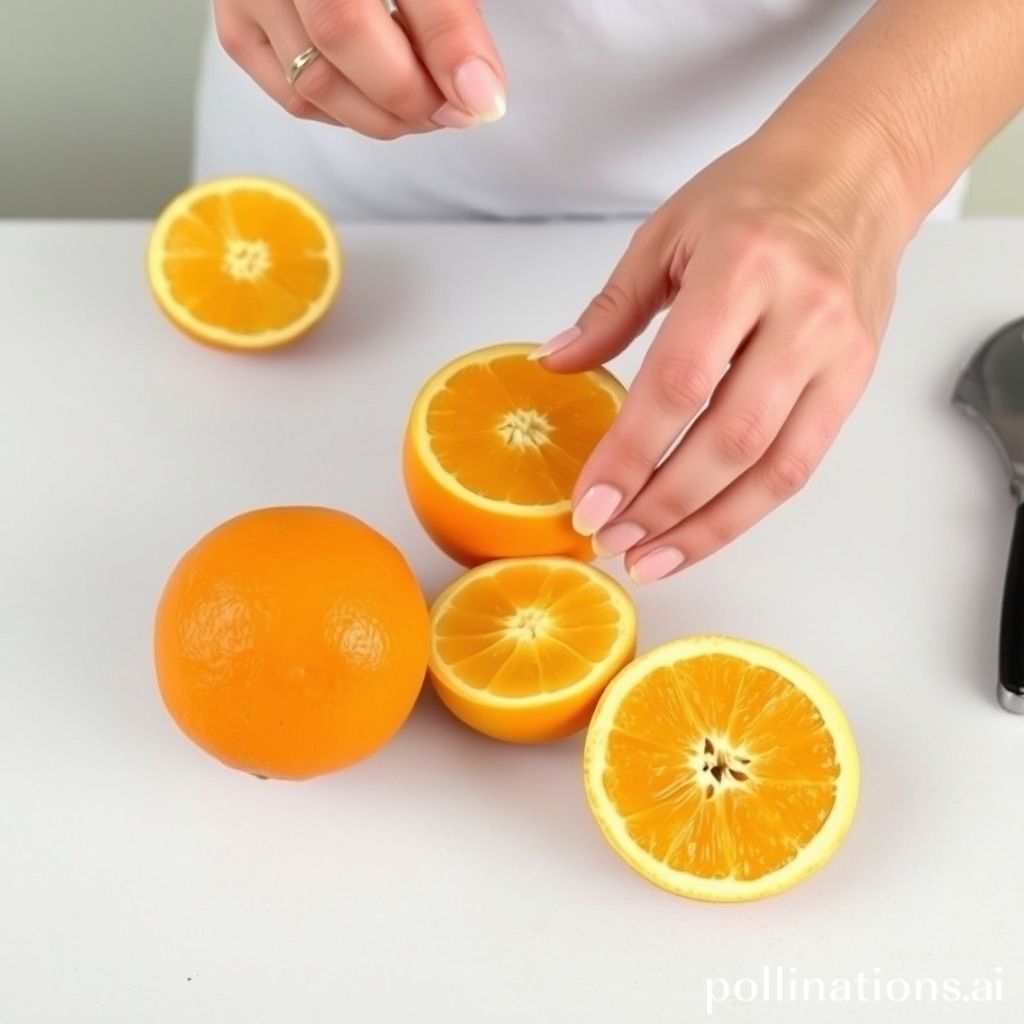Easy Homemade Orange Juice Recipe: No Juicer Required!
Making orange juice without a juicer is a simple and convenient way to enjoy the refreshing taste of citrus at home. Whether you don’t have a juicer machine or you’re just looking for a quicker method, there are plenty of ways to extract the juice from oranges using common kitchen tools.
From hand squeezing to using a blender or a citrus press, these alternative methods will have you sipping on homemade orange juice in no time. So, grab a few juicy oranges and get ready to discover how easy it is to make your own fresh and delicious orange juice without a juicer.

Table of Contents
Equipment needed to make orange juice without a juicer
1. Citrus reamer
A citrus reamer is a simple and effective tool for extracting juice from oranges and other citrus fruits. It has a handle with a pointed end and ridges or bumps on the surface. To use a citrus reamer, cut an orange in half and hold it firmly with one hand. With the other hand, press the pointed end of the reamer into the flesh of the orange and twist it back and forth. This will help release the juice from the fruit.
2. Blender
If you don’t have a citrus reamer, a blender can also be used to make orange juice. Start by peeling and segmenting the oranges, removing any seeds or pith. Place the orange segments into the blender and blend until smooth. To remove the pulp, pour the blended mixture through a fine-mesh strainer or cheesecloth. This will separate the juice from the pulp, giving you smooth and delicious orange juice.
3. Fine-mesh strainer
After using a blender or citrus reamer to extract the juice, it’s important to strain it to remove any pulp or seeds. A fine-mesh strainer is perfect for this task. Simply pour the juice through the strainer into a pitcher or container. The fine mesh will catch any unwanted solids, ensuring that you have pure and pulp-free orange juice.
With these three simple pieces of equipment, making orange juice without a juicer is easy. Whether you choose to use a citrus reamer or a blender, these tools will help you create delicious homemade orange juice. Enjoy!
Expert Tips: Extract juice from oranges without a juicer using a citrus reamer or blender. Strain with a fine-mesh strainer for smooth results.Choosing the Right Oranges for Juicing
1. Selecting Ripe and Juicy Oranges
When making orange juice without a juicer, it is important to choose ripe and juicy oranges to ensure you get the best flavor and juiciness possible. Here are some tips for selecting the best oranges:
- Look for firmness: Choose oranges that feel firm and heavy for their size. Avoid ones with soft spots or wrinkled skin, as they may be overripe.
- Check the skin color: Opt for oranges with bright, vibrant orange skin. Avoid ones with green tinges, as they may not be fully ripe.
- Smell the oranges: Give them a gentle squeeze and take a sniff. Ripe oranges should have a fragrant citrus aroma.
2. Considering Sweetness and Acidity Levels
When selecting oranges for juicing, it is important to consider their sweetness and acidity levels to achieve your desired taste. Here’s what you need to know:
- Sweetness: If you prefer a sweeter orange juice, look for varieties like Valencia or Cara Cara oranges. These oranges have a higher sugar content and offer a naturally sweet flavor.
- Acidity: For a tangier juice, choose oranges with higher acidity levels. Varieties like Navel or Blood oranges are known for their slightly tart taste.
Remember, the sweetness and acidity levels can vary depending on the season and growing conditions. Trying out different orange varieties can help you find the perfect balance for your taste preferences.
| Orange Variety | Sweetness Level | Acidity Level |
|---|---|---|
| Valencia | High | Medium |
| Cara Cara | High | Low |
| Navel | Medium | Low |
| Blood | Medium | High |
Preparing the oranges for juicing
1. Washing the oranges
Before juicing the oranges, it is important to thoroughly wash them to remove any dirt or residue on the skin. This step ensures that the final juice is clean and free from contaminants.
2. Rolling the oranges to loosen the juice
To extract the maximum amount of juice from the oranges, gently roll them on a countertop or cutting board. This helps to loosen the juice inside the fruit and makes it easier to squeeze out.
3. Cutting the oranges in half
Once the oranges have been washed and rolled, the next step is to cut them in half. Use a sharp knife to make a clean cut through the center of the orange, dividing it into two equal halves.
Alternatively, you can also use a citrus reamer or a fork to pierce the orange and extract the juice directly without cutting it into halves.

Using a Citrus Reamer to Extract Juice
1. Holding the Orange Half over a Bowl
To make orange juice without a juicer, start by cutting an orange in half. Hold one half of the orange over a bowl to catch the juice.
2. Placing the Reamer at the Center of the Orange
Take a citrus reamer, a handy tool for extracting juice from citrus fruits. Firmly position the reamer at the center of the orange half.
3. Applying Pressure and Rotating the Reamer to Extract Juice
Apply gentle pressure to the reamer and rotate it in a circular motion. The reamer’s ridged surface will break the pulp and release the juice. Continue rotating the reamer In the course of applying pressure until all the juice is extracted from the orange.
Using a citrus reamer is a simple and effective way to make orange juice without a juicer machine. It allows you to manually extract the juice using common kitchen tools, providing a convenient alternative for those who don’t have a juicer at home.
| Benefits of Using a Citrus Reamer: |
|---|
| – Easy to use and requires minimal effort |
| – Convenient for making small batches of orange juice |
| – Does not require electricity or additional appliances |
Next time you want to enjoy a glass of freshly squeezed orange juice, grab a citrus reamer and follow these simple steps to extract the juice without the need for a juicer machine.
Using a Blender and Strainer Method
To make orange juice without a juicer, you can follow these simple steps using a blender and a strainer.
1. Squeezing the Juice from the Oranges into a Blender
Start by manually squeezing the juice from ripe and juicy oranges into a blender. It’s important to use oranges that are ripe and juicy to ensure the best flavor and yield. Roll the oranges on a countertop before squeezing them to help release the juice. Be careful to avoid any seeds that may accidentally fall into the blender.
2. Blending the Juice on Low Speed
Once the orange juice is in the blender, secure the lid tightly and blend on low speed for a few seconds. The purpose of blending is to break down any remaining pulp and mix the natural sugars with the juice. Avoid overblending, as it can introduce excessive air bubbles and affect the texture of the juice.
3. Pouring the Blended Juice through a Fine-Mesh Strainer
After blending, pour the juice through a fine-mesh strainer into a container to separate the pulp from the juice. The strainer will help remove any remaining fibers, resulting in a smooth and pulp-free orange juice. Use the back of a spoon to gently press the pulp against the strainer, ensuring maximum juice extraction.
Using the blender and strainer method allows you to make fresh orange juice without a juicer. It is a convenient alternative that utilizes common kitchen tools. Remember to clean the blender and strainer thoroughly after use to maintain their longevity and prevent any residual flavors from affecting future batches of orange juice. Enjoy your homemade orange juice!
Conclusion
Making orange juice without a juicer is a simple and rewarding process that can be achieved using common kitchen tools or appliances. By embracing alternative methods or techniques, you can easily enjoy the satisfaction of homemade orange juice whenever you desire.
Additionally, you can get creative and experiment with different variations by adding other fruits or herbs to enhance the flavor. So, why not give it a try and savor the refreshing taste of freshly squeezed orange juice right at home?
FAQ about How to Make Orange Juice Without a Juicer
FAQ 1: Can I use a regular strainer instead of a fine-mesh strainer?
Yes, you can use a regular strainer as an alternative to a fine-mesh strainer. Conversely, keep in mind that a regular strainer may not remove all the pulp from the juice, resulting in a slightly pulpier texture.
FAQ 2: How long does homemade orange juice last?
Homemade orange juice can typically last for about 2 to 3 days when stored in the refrigerator. It is important to consume it within this time frame to ensure freshness and avoid spoilage.
FAQ 3: Can I store the orange juice in the refrigerator?
Yes, it is recommended to store homemade orange juice in the refrigerator. Refrigeration helps to maintain its freshness and prevent bacterial growth. Make sure to store it in an airtight container to preserve its flavor and quality.
FAQ 4: Can I make orange juice without any equipment?
Yes, you can make orange juice without any specialized equipment. Simply peel the oranges and remove any seeds. Then, squeeze the juice out by hand or use a fork to press the orange segments against the sides of a bowl. Strain the juice through a sieve or cloth to remove any pulp.
FAQ 5: Can I use bottled orange juice instead of fresh oranges?
In the course of it is possible to use bottled orange juice as a substitute for fresh oranges, it may not provide the same taste and freshness. Fresh oranges contain natural flavors and nutrients that may be lacking in bottled juice. Conversely, if fresh oranges are not available, using bottled orange juice can still be an option.
Read Similar Post:
1. Can Orange Juice Discolor Teeth? Find Out the Truth About Dental Staining
2. Boost Your Liver Health: The Truth About Orange Juice’s Impact
